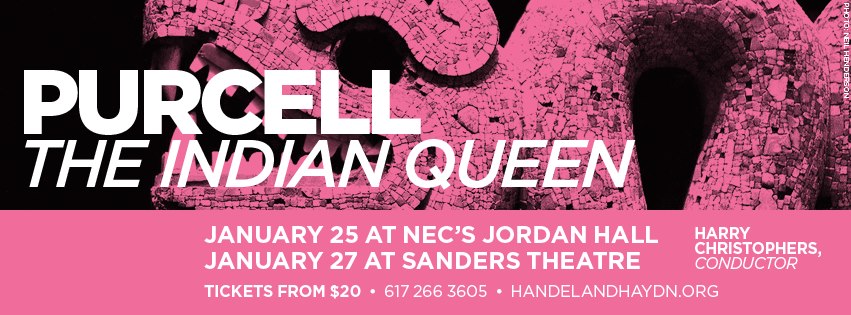
presented by the Handel and Haydn Society
Harry Christophers, Artist Director
Aisslinn Nosky, Concert Master
John Finney, Chorusmaster
January 25 & 27, 2013
Jordan Hall & Sanders Theatre
Boston, MA
Handel and Haydn Facebook Page
There are some culture-lovers reluctant to attend an evening of opera. Some fear pomp and stuffiness; others fear boredom. These fears encumber the uninitiated with false bias against the excellence that only classical music can convey. H&H’s performance of The Indian Queen was entirely lacking in snobbery and the program notes were jam packed with enough historical trivia to entertain a fidgety toddler. The music of Purcell was warm and gentle. It wrapped around the audience like an electric Snuggie; a balm for the bitter winter chill.
The Indian Queen (TIQ) was written by Sir Robert Howard (in collaboration with John Dryden), with incidental music by John Banister, Sr. It was first performed in 1664; Henry Purcell expanded Howard’s play in 1665. Selections from Purcell’s other works The Fairy Queen and King Arthur are performed in the first half.
Artistic Director, Harry Christophers is an engaging and lively conductor. He gracefully moves with the music in ways reminiscent of avid club kids moving to “their jam.” He is attentive to his musicians with a care that appears both tender and passionate. He must be a wonder to perform with.
The first half of the concert featured some staging. Parts of it were awkwardly blocked, but succeeded in making the performance more accessible. In particular, the performance of Jonathan Best was exceptional. He is a vivid performer who exudes complete comfort on the stage. He puts as much effort into his acting as he does into his singing (a rare trait on the operatic stage, to be honest). His fervor was so effective in “The Frost Scene” from King Arthur that it reminded me of the nasty weather awaiting me outside. Touché, Mr. Best.
The second half of the concert varied greatly from the first due to a condition that I refer to as Musician’s Hibernation. Knowing that a long stretch awaits them, the instrumentalists and vocalists suffering MH tuck away their performance energy, saving it for the long haul to focus on technique. Fearing a dramatic reduction of stamina, they use the remainder of their energy solely for the finale. In H&H’s production, this could have been avoided by using similar staging as the first half.
Also, to be callous, singing in a chorus does not exclude one from interpreting the text for the benefit of the audience. This was the case with one or two Mezzo exceptions.
Callousness aside, it was a lovely concert. Handel and Haydn Society is a grand source of culture in the Boston area. The Purcell gems that they offer in these two concerts are well worth attending. The entertainment is multi-layered – sometimes unintentionally. If the ethereal music and the program notes aren’t enough to capture one’s attention, one can always follow along with the program text and watch as the audience simultaneously turns the pages as if they were part of the ensemble. It is quite droll.
*Ladies and gentlemen, the incomparable Mr. Billy Ocean.
